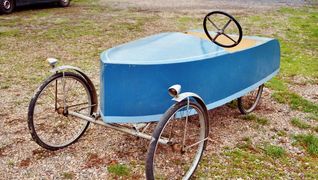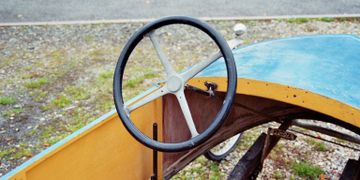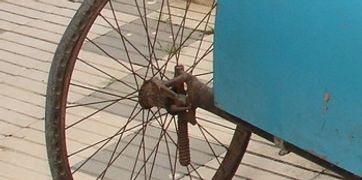Velocars
December 1927
In this snippet from first December 1927 we have the first publicised mentioning of the 'Velo-Car' which in all it's descriptions fits Georges Mochet: 2 seats, 3 gears, 4 wheels, independent drives and free wheeling. From an article from June 1927 we know that Mochet was building the 4CV C.M. car. Maybe after it's decline/failure he switched to new adventures with the 'Velo-Car'?
The Beginnings in Spring 1928

This is a snippet from the first Press article with a Velocar shown that I could find (over the last 20 or so years) and it is from 24th March 1928. I highly doubt if any Velocar related activities really happened in any larger scale before that. You can find various photos of this presentation with a total of 6 Velocars including the famous single seater on Getty Images (search for 'during the Best craftsman show at the Grand Palais in 1928')
Velocar Advert 1928

Our first known Velocar advert. September 1928 in La Science et la Vie. The address is still Rue Soubise at Saint-Ouen.
Velocar Catalogue

Snippet from an early catalogue. Right from the start it was not only personal transport and leisure that Mochet tried to sell to but the trade as well. The 'Fourgonette' did cost 2,900 Francs while the regular Vaelocar started from 2,500 Francs.
Velocar Catalogue

In this early catalogue (with the address still as Saint-Ouen) is a reference to a letter from 9th October 1927. From all the snippets, adverts and articles that we were able to access or collect we are unable to get anything useful from before 1928. Could it be that this was a pre-production Velocar that was tested in Autumn 1927???
Velocar Advert 1929

An advert published in 1929: Mochet has now the famous Rue Roque-de-Fillol in Puteaux as his commercial asddress. This will be the same address until the factory closes.
Velocar c. 1928-1930
Velocar c. 1928/1930

One of the earliest known Velocar. The frame is c. 20 cm longer than later (more common) models. Proudly owned by Sascha.
Velocar c. 1928/1930

'Drivers' view.
Velocar c. 1928/1930

Pick up in France near Paris in November 2006 ....
Velocar c. 1930
Another fine and early Velocar. Still got the long frame but a different bodywork which allows more space for the feet.
Velocar c. 1930
Beautiful long shape.
Velocar c. 1930

The early makers plate.
1930s Velocar
1930s Velocar

We both had an interest in Mochet and it all really kicked of with this restored machine. The Bodywork is not very original. But it is our first Mochet and everything really kicked of from that.
1930s Velocar Dashboard

Drivers View with the typical break leavers that Mochet used for many years.
1930s Velocar

The 2 individual drives.The body work of drivers side would always have been closed for better overall stability.
1930s Velocar Undersite

A simple tubular frame holds everything.
1930s Velocar Gearing

The Velocar has 3 gears each with it's own chain and freewheels to the back when disengaged. Both drives for the drivers have a freewheel too.
1930s Velocar Front Axle

The typical bronze casting for the front wheels with the steering arrangement.
Velocars with 650x50 Ballon wheels
Modele Confort

Really nice example of a Modele Confort
Modele Confort avec caisson camionnette

Modele Confort avec caisson camionnette used as an entertainment vehicle.
Modele Confort avec caisson camionnette

Another fine example of a Camionnette. Shown at the famous Montlhery race track near Paris.
Modele Confort

One example that get used quite bit and is home in Belgium.
Modele Serie
A typical mid/late 1930 Velocar Modele Serie with the simpler bodywork. I personally like this shape a lot as it has (remote) similiraity ti the famous Mercedes Cars from the 1920s. Although rusty a beautiful original condition with the extremely fragile original canvas over plywood body.
Modele Serie

A restored Modele Serie Camionnette. Home in the North of England. Probably around Britain all it's life?
Velocar Modele Cyclotourisme
Velocar Modele Cyclotourisme

With the success of the Velo-Velocar Mochet brought out an updated and more sporty version of the Velocar. We cannot establish a correct year. A dated photo of 02/08/1936 was sold in 2009. Above catalogue came with an envelope sent in 1937.
Velocar Modele Cyclotourisme

Differences are a handle bar instead of a steering wheel, a more reclined seating position, a more 'normal' derailleur with a 4-speed and most significantly smaller wheels.
Velocar Modele Cyclotourisme
Handlebar with 'Velocar' break levers!
Velocar Modele Cyclotourisme

Insead of the bronze front wheel assembly now a welded assembly with a suspension. Wheel size initially advertised as 500x50 but changed to 450x55A as on the Velo-Velocars. All Cyclotourisme we know have 450x55A.
Velocar Modele Cyclotourisme

A derilleur a bit like on a bicycle with 4 gears and only one chain going to the rear axle instead of 3 as previously.
Velocar Modele Cyclotourisme
The newer maker's plaque proudly showing the hour record of 1933 (unfaired Velo-Velocar) and the hour record in the fully faired machine ('open class'). This plaque can't have been in use before March 1939 as the record was set in early March 1939.
Velocar revised model circa 1941
Velocar circa 1941

There are a few press photos from c. 1941 presenting a new Velocar and a new Velo-Velocar. "Vélocar" sur le pont de Puteaux (Hauts-de-Seine).
Velocar c. 1941 & after

Welded front axle assembly with a suspension and most importantly Solid Tyres. By using solid tyres (in combination with a suspension) for the front wheels Mochet could double his production using the allocated Pneumatic only for the rear wheels.
Velocar c. 1941 & after

This Velocar was sold in Spain in 2012.
Velocar c. 1941 & after

Hermann Brunings Velocar with front suspension.
Velocar c. 1941 & after

Another shot of Hermann Bruning's Velocar.
Velocar c. 1941 & after
Another example with the front suspension and the original solid tyres.
What to use a Velocar for?
Travel the World - or France
Snippet from 16/09/1928 of the arrival of travellers in Marseilles on their way through all cities of France. Other traveller postcards known.
Hire a Velocar in France
A hire Velocar in Porchinet (near Nantes) in 1936. Other places had them as well. In Belgium loads of Cuistax look very similar to Velocars and were probably self made copies of that towns.
Hire a Velocar in France

Unknown year and unknown location, but it is a Velocar.
Velocar as a Velotaxi in Paris

During the occupation in the Second World War there were all sorts of Bicycles used as Velotaxis and a few Velocar's too!
Hire a Velocar in Bermuda
The first time we came accross this was in 2012 and could not really believe it but now you can find relevant sources for 1937 and 1938. There were no cars in Bermuda allowed.
Hire a Velocar in Bermuda
Tourist Rental in St. Georges in Bermuda -you can find two videos here: https://www.youtube.com/watch?v=p4BJOb99mZA